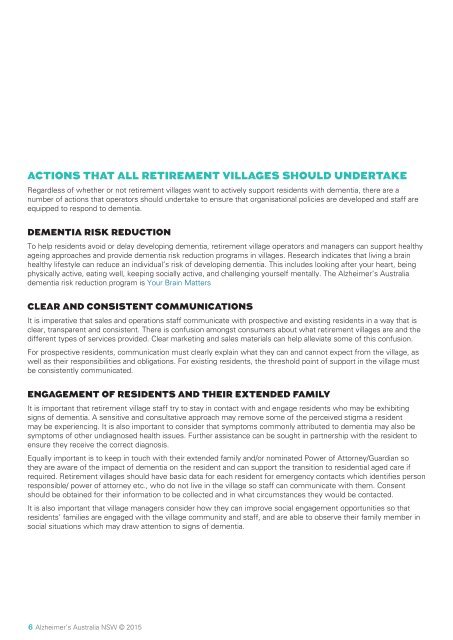DEMENTIA GUIDE FOR THE AUSTRALIAN RETIREMENT VILLAGE INDUSTRY
AANSW_Dementia_Guide_for_the-Australian_Retirement_Village_Industry
AANSW_Dementia_Guide_for_the-Australian_Retirement_Village_Industry
Create successful ePaper yourself
Turn your PDF publications into a flip-book with our unique Google optimized e-Paper software.
ACTIONS THAT ALL <strong>RETIREMENT</strong> <strong>VILLAGE</strong>S SHOULD UNDERTAKE<br />
Regardless of whether or not retirement villages want to actively support residents with dementia, there are a<br />
number of actions that operators should undertake to ensure that organisational policies are developed and staff are<br />
equipped to respond to dementia.<br />
<strong>DEMENTIA</strong> RISK REDUCTION<br />
To help residents avoid or delay developing dementia, retirement village operators and managers can support healthy<br />
ageing approaches and provide dementia risk reduction programs in villages. Research indicates that living a brain<br />
healthy lifestyle can reduce an individual’s risk of developing dementia. This includes looking after your heart, being<br />
physically active, eating well, keeping socially active, and challenging yourself mentally. The Alzheimer’s Australia<br />
dementia risk reduction program is Your Brain Matters<br />
CLEAR AND CONSISTENT COMMUNICATIONS<br />
It is imperative that sales and operations staff communicate with prospective and existing residents in a way that is<br />
clear, transparent and consistent. There is confusion amongst consumers about what retirement villages are and the<br />
different types of services provided. Clear marketing and sales materials can help alleviate some of this confusion.<br />
For prospective residents, communication must clearly explain what they can and cannot expect from the village, as<br />
well as their responsibilities and obligations. For existing residents, the threshold point of support in the village must<br />
be consistently communicated.<br />
ENGAGEMENT OF RESIDENTS AND <strong>THE</strong>IR EXTENDED FAMILY<br />
It is important that retirement village staff try to stay in contact with and engage residents who may be exhibiting<br />
signs of dementia. A sensitive and consultative approach may remove some of the perceived stigma a resident<br />
may be experiencing. It is also important to consider that symptoms commonly attributed to dementia may also be<br />
symptoms of other undiagnosed health issues. Further assistance can be sought in partnership with the resident to<br />
ensure they receive the correct diagnosis.<br />
Equally important is to keep in touch with their extended family and/or nominated Power of Attorney/Guardian so<br />
they are aware of the impact of dementia on the resident and can support the transition to residential aged care if<br />
required. Retirement villages should have basic data for each resident for emergency contacts which identifies person<br />
responsible/ power of attorney etc., who do not live in the village so staff can communicate with them. Consent<br />
should be obtained for their information to be collected and in what circumstances they would be contacted.<br />
It is also important that village managers consider how they can improve social engagement opportunities so that<br />
residents’ families are engaged with the village community and staff, and are able to observe their family member in<br />
social situations which may draw attention to signs of dementia.<br />
6 Alzheimer’s Australia NSW © 2015


